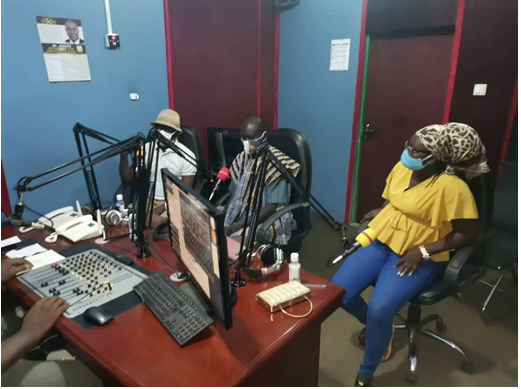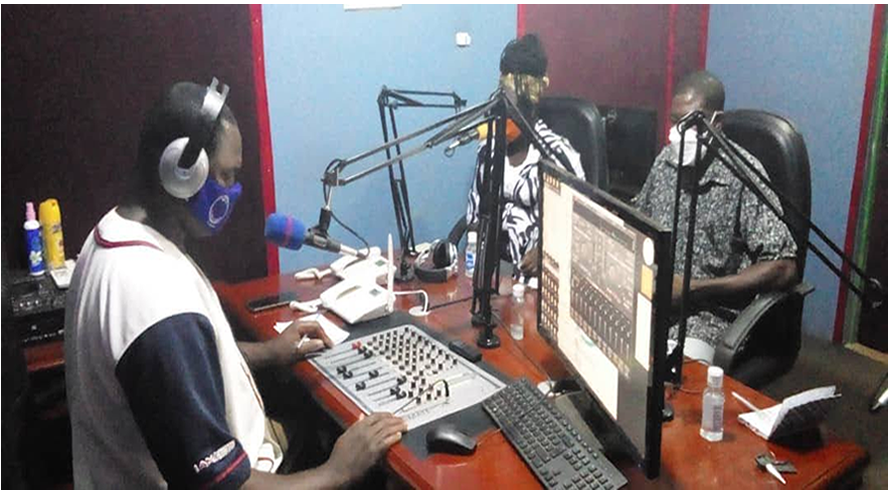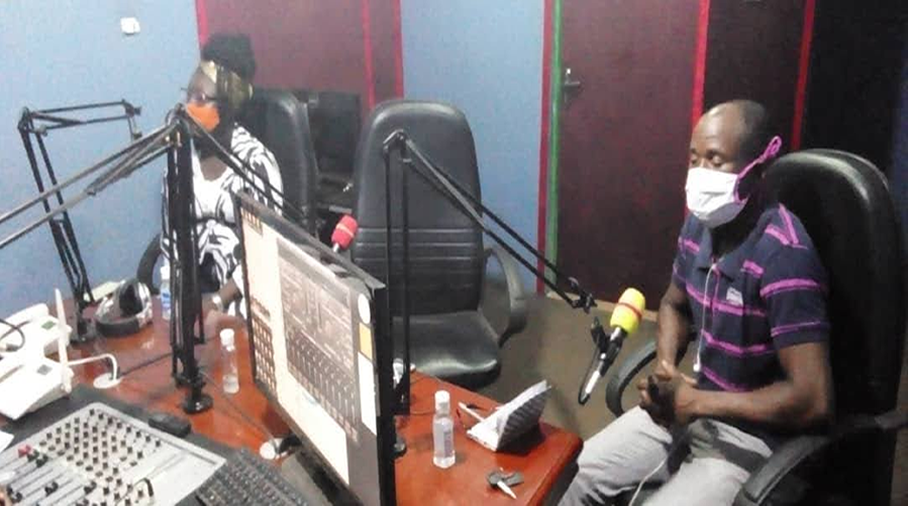- Behind the Builsa South District Assebmly
- +233207896899
- admin@vboyouth.org
RADIO SENSITIZATION ON WATER, SANITATION & HYGIENE (WASH)
Introduction
World Vision in collaboration with Visionary Buluk organized four weeks radio sensitization program on Water Sanitation and Hygiene (WASH) and Covid 19 in the Builsa south district to commemorate World toilet day. The program engaged resource persons (panel) from the local assembly in the form of discussion. The sensitization took four weeks and in each week, two days was set aside to discuss varied topics that will help broaden the knowledge of listener. The radio frequency covered two main districts that is Builsa South and North as well as some parts of Kasena Nankana Municipal and West Districts. The focus of the sensitization was on the Builsa South because world vision is operating the WASH project in six communities of the district hence the main languages that was used were Buili and English. The sensitization made provision for call-in for listeners to call and make their contributions and ask questions. This also allowed the team to measure the participation level of the program by listeners.



Objectives of the Program
The overall objective of the radio sensitization was to improve the knowledge of listeners on Sanitation and Hygiene Practices in communities, households and Institutions. The specific objectives included
• To Increase community member’s knowledge and awareness on the importance of improved sanitation and good hygiene practices and the link to health and child wellbeing through radio sensitisations
• To increase understanding and the practice of appropriate hand washing with soap
• To Increase awareness of the importance of including the WASH needs of children, girls and persons with disabilities in providing WASH facilities
• To disseminate preventive and protective messages to stem the spread of COVID19
Outcomes
• Increased household’s knowledge and skills on appropriate sanitation and hygiene behaviour change practices that now have access to hand washing facilities with soap and water available
• Increased understanding of and the practice of appropriate hand washing with soap
• Increased awareness of the importance of gender and disability friendly inclusion of WASH facilities
• Increased community members knowledge on protective and preventive measures to stem
the spread of COVID19
Discussion Process
The radio sensitization consisted of a team with wide range of experience in Sanitation and Hygiene. There was Builsa south public health representative, district environmental health and Sanitation representative, National Commission for Civic Education (NCCE) representative and the representative of an artisan. In each week, a team of three or four is tasked to discuss various thematic areas that will help to achieve our objectives. Each week, World Vision and Visionary Buluk represent whilst the other resourced persons varied depending on the topic under discussion.
Week One
The first week discussion started with introduction of the various organizations and their role in the program. World Vision gave their mission and vision as well as the Visionary Buluk and the reason for the radio sensitization. The organizations each encouraged listeners to pay attention and contribute for a better realization of it objectives. The team went further to make the listeners understand the meaning of sanitation especially when it comes to toilet, waste water and disposal water. The basic sanitation at home as well as limited and unimproved sanitation facilities was also discussed. The district sanitation officers gave the current state of sanitation in the district. The F- diagram also helped the panelist to explain to the public the major transmission routes of faucal oral diseases. The first week ended with a discussion on Covid 19, measure and protocols especially at school and work places. The call in for the week recorded about 21 calls most of which emphasis was placed on the fact that the listeners were grateful for such a discussion on radio and would like to have that every week to educate the public because the behavior of people
is making hygiene and sanitation difficult to achieve, but if the radio keeps sensitizing them, there will be a change. The listeners also added that there is the need to have a lot of public sanitation facilities and people to be in charge to keep them neat at all times. At the end of the week one, the discussion lasted for 2 hours 30 minutes.
Week Two
In week two, the team discussed the importance of hand washing, where and how to set up a hand washing facility, the statistics about the benefits of hand washing in the district. The second week discussion also ended with discussion on prevention and how to stop the spread of covid 19. Second week gave us 18 calls and 5 missed calls. Almost all the calls were contributing to the program and how important it is to wash hands regularly. Susana Apaabey who called from Sandema said, for more than 8 months her kid of five years has not gotten infection, “ I use to visit the clinic almost every month because of infection” but after hand washing was made mandatory, she can testify that her household level of hygiene related sickness has reduce. So she will advice that we keep educating the public on hand washing. The discussion took 2 hours 50 minutes each day.
Week Three
The third week discussions centered on the proper and safe transportation, handling, storage and dispensing water for drinking at source point and at household level. The discussions also touched on methods of treating water for drinking at the house hold level. The discussions were closed for the week with prevention and protective measures to stem the spread of Covid 19. Twenty one calls came in and 19 where able to be attended to. Listeners were concern with type of water they drink, some raised issues of finding sand in the water they fetched from boreholes, they were
advice that boiling water is the best and cheapest every individual can do at home and they were encouraged to always do that for safe drinking of water. The discussion for the third week lasted for 2hours 15 minutes per session.
Week Four
The radio sensitization came to an end on the fourth week where listeners where taken through factors to consider when one wants to build a latrine, types of latrines and estimated cost, various components of improved latrines and their importance, pit dimension and education of latrine maintenance. Varied issues came up from this discussion. 16 calls came through and 11 were attended to. This was because most of the question needed more clarification and limited number of calls will give way to explain to listeners. The discussion lasted for 2hours 45 minutes per
session.
Some suggested recommendations from Listeners
• Covid 19 protocols should be properly enforced especially in schools and teachers should take the responsibility to ensure that students adhere to the protocols
• Sanitation and Hygiene involves behavioral change, therefore this radio Sensitization organized by World Vision and Visionary Buluk should be organize if not once a week, once a month will help the people in the district change their character
• Traditional rulers should be part of water Sanitation and Hygiene (WASH) programs in their communities so that sanctions and fines can be given to people who will not adhere to WASH protocols
• World Vision and Visionary Buluk should support the government to build more public sanitation facilities like toilets in public places
• The district assembly should set by laws that can punish people who violate the law
• World Vision should extend the WASH project to Builsa North as well
• The village saving and Loans model is really helping the communities, therefore World Vision and Visionary Buluk should try and extend to the communities that do not have
• World Vision and Visionary Buluk should support the district environmental health and sanitation officer with transportation to help him implement his activities properly
• Musidema community appealed for support to build to public toilet

